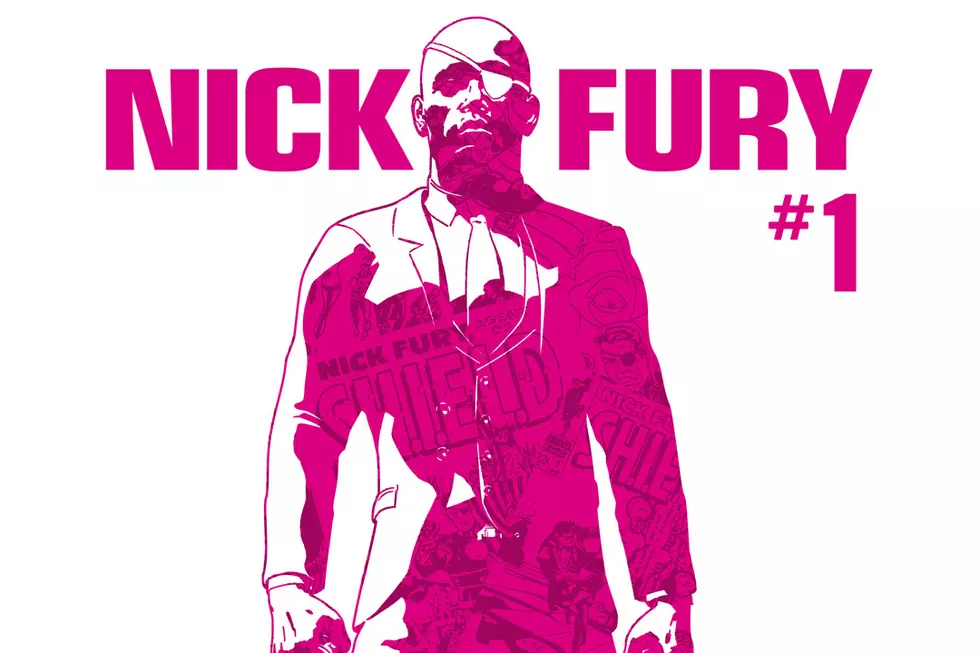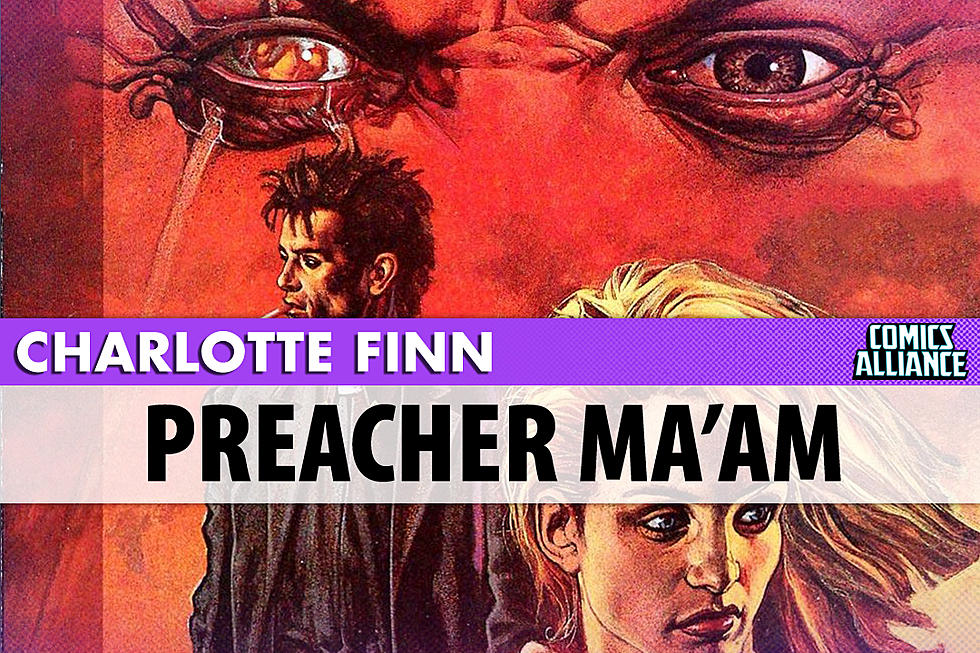
Ask Chris #296: Starman And The Challenge Of Holding Up
Q: How does a (great) but very '90s comic like Starman hold up today, given its dated references like Chris Isaak? -- @david_wolkin
A: What's that? You want me to write a thousand words about that one panel from Starman where Jack Knight compares himself to Chris Isaak because for some reason he (and James Robinson, I guess) thought he was the single coolest person in the world in 1994, and ended up with what might be the most ridiculous piece of dialogue of the entire decade?
Can do, dear reader. Can do.
Don't worry, I'll get around to the actual question that you're asking in a second. Believe it or not, though, I think that this panel actually is one of the keys to understanding exactly what the problems are with Starman, and they're not necessarily the ones that you suggest.
If you're not familiar with Starman, it's a comic that's about a lot of things. First and foremost, it's a story of legacy, but it's also about history, about the different ways the past can affect us and shape who we are and, maybe more importantly, who we're going to be. It's a book about superheroes and the way that they can change things not just on the large scale of fighting crime and apprehending villains, but on a smaller level, focusing on the way those powers and responsibilities shape the relationships between people and their homes. It's about the choice between living up to what's expected of you and moving past it, and how sometimes it's possible, and maybe even better, to do both.
And it's also a story about a straight white dude in his 20s who has a lot of issues with his father and an aversion to adult responsibilities. And as you may have noticed from, you know, the entirety of media, we're not exactly running short on those, even if this one in particular is generally extremely well told. As we pass two decades since it made its debut, I think that might make it a harder sell to more modern audiences than any references to the Roy Orbison of the '90s. For a series that was coming out from DC Comics in 1994, though, it was a revelation, and in terms of tone, it still reads like it's at least a decade ahead of its time.
The dude in question is, of course, Jack Knight, the youngest son of a Golden Age hero called --- you guessed it --- Starman. He's kind of the black sheep of the family, the artsy and rebellious one who has no intention of following in his father's footsteps until his older brother, David, is murdered by a villain on his first night as the all-new Starman. With his home city in danger, Jack steps up, and then the weirdness of being a superhero --- cursed movie posters that are actually portals to hell, pirate ghosts, trips to space that last for well over a year, the usual stuff --- follows him around for the next eighty issues.
And throughout those issues, Jack's story weaves its way through the DC Universe in a very interesting way. At a time when comics in general seemed like they were focusing on moving forward and distancing themselves from the history of the universe, books like Starman and Flash coded legacy and history into the very premises of the book.
The thing is, Flash had always been a pretty popular character in a book with bold adventures and danger at the speed of light. Starman was an obscurity, a legacy that started with a Golden Age also-ran and a name so generic that it had weaved its way through a half dozen failed attempts at making it work. Starman became a book about embracing that obscurity and tying it together into something bigger, weaving everything from Ted Knight's cosmic rays to Will Payton's d-list heroics to the Legion of Super-Heroes into one big story.
And because it did that, and because it did it so well, it ended up becoming, and I say this without a hint of exaggeration, one of the most influential DC comics of all time. I don't think it's a stretch to say that without Starman, you wouldn't have Geoff Johns becoming The Guy at DC, and that's a connection that happens on pretty much every level. From a purely structural standpoint, Johns's favorite trick of tying in details and unifying disparate comic book mythologies into a single whole --- something that you can see on display even in recent stories like The Darkseid War, where he makes an attempt at tying the Anti-Monitor into the Fourth World --- was James Robinson's trademark on Starman.
On a more direct level, though, Starman sparked the revival of Golden Age heroes that begat JSA, which in turn begat Johns cowriting with David Goyer in the gig that first got him labeled as a "superstar writer" --- and it doesn't hurt that Starman, the critical darling that ruled the '90s with its personal, detail-oriented approach, ends with James Robinson and Tony Harris's Jack Knight literally handing his legacy to Geoff Johns and Lee Moder's Courtney Whitmore:
Courtney had, of course, been around for a little bit in Stars and STRIPE (still probably the most underrated comic Johns ever did), but there's no way that book would've happened if Starman hadn't paved the way.
All of which is to say that Starman isn't just good on its own, it's also one of the key books for understanding how and why the DC Universe took the shape that still defines it today, fifteen years after that final issue hit the stands. But while I have no trouble calling it a masterpiece, I'll admit that it has its flaws.
Which brings us back to Chris Isaak.
Dubious reference aside, that panel is kind of endemic of not just the book's more notable flaws, but also why they kind of work. And first and foremost among them, we have the dialogue.
Robinson's dialogue in Starman is about as far from naturalistic as you can possibly be without going into full-on Darmok And Jalad At Tanagra territory. It's not just the bold pronouncements and exclamation points that we're familiar with from superhero comics, and it's not just the Claremont wordiness that comes with full pages of exposition. It's not quite either of those, while also being both of them, combined into phrases that no human being would ever say out loud. It's stilted and awkward, the kind of dialogue that might as well be a neon sign hanging over you that's constantly flashing, "You are readiing a story that someone made up and wrote down," while you're trying to lose yourself in this world that it's creating.
It creates a barrier, and when you combine it with Jack's personality, you get something that can be pretty difficult to get past.
Because in a lot of ways, Jack Knight is insufferable.
The whole idea of Jack waxing lyrically about how he's not cool while flying through the air and beating up a supervillain sets the tone for everything about that dude. The idea that Jack's not cool is a mission statement for the book --- that scene's in #3, the climax of the first arc --- but everything that makes him uncool is not-so-secretly somethign that's actually super-cool after all. He's a handsome dude with a bunch of tattoos whose superhero costume is a cool leather jacket over his street clothes --- which are, of course, vintage hipster wear --- who would rather be collecting pop culture antiques and hand-painted Hawaiian shirts than be fighting crime. He is cool --- studiously, consciously cool, in fact, and certainly too cool to be anything as silly as a superhero.
Which, of course, is another theme that would recur through the next few decades of the DC Universe.
And because of that, Chris Isaak is the perfect point of reference for him. I was always surprised that he'd go with something so contemporary --- if Jack Knight's as obsessed with the past as he's saying in that mid-fight soliloquy, then you'd think he'd go with someone a little more timeless. Nothing as mainstream as Elvis of course, but Steve McQueen? David Bowie? Something like that, surely. But no, it's Chris Isaak, which, when you think about it, is the most studiously, purposefully cool reference of all. Jack Knight doesn't think Chris Isaak is cool because of "Wicked Game," he thinks he's cool because he was in Twin Peaks: Fire Walk With Me.
Seriously, don't you want to punch him in his stupid super-cool face?
So yeah, Starman, for all its focus on the past, is definitely A Product Of Its Time. But I don't think it's the pop culture references that hold it back, even if the issue where Jack Knight hangs out with Batman and the Golden Age Green Lantern and they just stand around talking about their favorite Woody Allen movies --- which I swear to God actually happens --- is pretty rough.
Incidentally, Batman not caring about this stupid conversation makes that panel the second-best Batman story Robinson ever wrote.
The barriers to entry on this one are, instead, based entirely on style and subject matter. The line while it was coming out was that Starman was a superhero comic for people who didn't like superhero comics, but that's not really accurate. It's a superhero comic in every way, and it deals with all of its themes --- both the big ones and the small, personal ones --- in a way that's every bit a part of the superhero genre. But its greatest accomplishment is that it makes them accessible to readers who are obsessed with the history of the DC Universe, and the people who were completely unfamiliar with it.
So yeah: By and large, with the exception of a couple of rough spots, it holds up. More than anything else, I think you can compare Starman to something like Astro City, a book that introduces its readers to an entire universe that functions to serve the story. The only difference is that the universe Starman's working with is one that already existed.
And also that Samaritan doesn't go around talking about how cool he is while he tries to buy vintage bakelite, I suppose.
Ask Chris art by Erica Henderson. If you’ve got a question you’d like to see Chris tackle in a future column, just send it to @theisb on Twitter with the hashtag #AskChris.
More From ComicsAlliance
![The Odds Are Stacked And The Stakes Are High In ‘Nick Fury’ #1 [Preview]](http://townsquare.media/site/622/files/2017/03/Nick_Fury_1_Featured.png?w=980&q=75)




![Witchcraft, Redemption and Family Ties: James Robinson Talks Scarlet Witch [Interview]](http://townsquare.media/site/622/files/2016/10/scarletwitch-feat.jpg?w=980&q=75)
![Aftershock Announces New January Books ‘Blood Blister’ and ‘Animosity: The Rise’ [NYCC 2016]](http://townsquare.media/site/622/files/2016/10/covers_featured.jpg?w=980&q=75)


